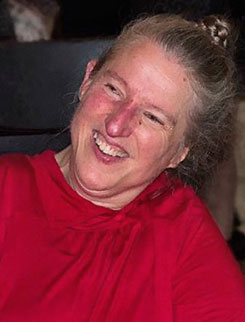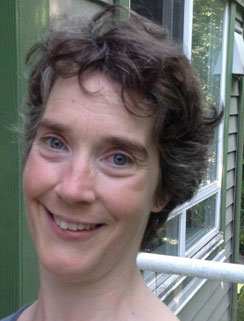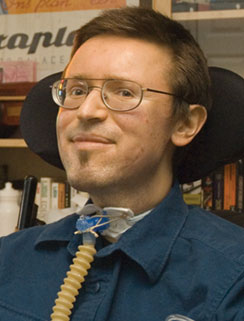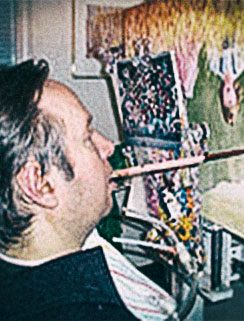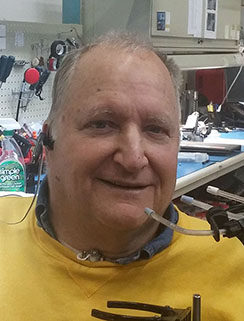Cathy Grant
Story
Cathy was born in the lower mainland of BC and has lived here her entire life. When she’s not working on her next column or writing project, Cathy is out exploring the world with her staff and friends, either in her wheelchair, van or on the computer.
Recently she wrote a piece describing in a deeply personal way how physical touching has impacted her life since childhood. We are proud to share her story with you.
“Without touch you can die.
I may not have died physically in the past, but my emotions and my soul were on the critical list several times. I feel that many people still have a problem touching individuals who are disabled. The reasons for these problems are many. Part of it might be ignorance, but mostly I think it is fear, fear that they may hurt me in some way, fear that my disability is somehow contagious, fear that they may get into trouble with me or someone else it they “invade my personal space”. These fears are often exacerbated by my electric wheelchair. I wish people (in the past, this included staff) could get over this, because it was contact with others that finally helped me to start healing.
The reason why touch is so important is because it lets the disabled person know that they are real. This might sound a bit strange but let me explain with an example from my own life.
I am a middle-aged woman with cerebral palsy. I would be the first one to admit that I am sensitive about parts of my body, and that if I move or am moved too quickly in the wrong way, it hurts and I let people know it. However, this does not mean that I am made out of glass! A gentle squeeze on the shoulder, back or hand is not going to break bones. If you are unsure about whether or not some form of touch is welcome or not, just ask! Whomever you are supporting or I will generally let you know.
When I am talking about hugs and touch in general, it is still very important to respect your own boundaries and those of the person you are supporting. A hug given under duress is not a good hug.
When I was very young, I was very upset one night and my dad picked me up and walked me through the house. As well as walking, he started to dance with me in the living room, with me in his arms. I remember this as if this happened only yesterday.
In the world today there have been studies whereby children who get touched are happier and healthier as they get older.
When my twin brother and I were born, we were both in incubators for around 52 days. The incubators at that time did not allow for much touch by medical staff, let alone parents. I personally feel that this had long term negative affects on me physically and emotionally, making it more difficult to relate to people around me and increasing my feelings of isolation.
I do know how I survived my childhood and my teen years with very little touch from the people around me. I did this by faith and determination that my needs would eventually be met. My needs finally started getting met just over a year ago. At this time I started getting honest and more open with my staff, my friends and most importantly myself. I try to stay honest even when things start to get rough. It has not been easy. I still have my bad days. Old tapes are played back and I’ve ended up in screaming matches with my staff or friends. However, in the end, the air has been cleared, and their hugs have let my body know that everything is all right.
In my past, I had lots of hug poster-poem sayings all through my house, but people never seemed to get the hint!
A really good example of what I’m talking about happened about a year and a half ago. I was talking to a new staff member who had had a lot of experience in the field. I was telling him about my life, an old story that I seemed to tell all of my staff, when he suddenly came over and gave me a big hug. At first I was floored that someone was actually perceptive enough to see what I really needed. Then, I felt as if he was truly there with me at that time in that place. I also felt emotionally safe for the first time in a long time. As soon as that happened all the anger and frustration that I had been holding onto for years came up and out. I cried and cried, and all that this new staff person did was hold on to me in silence. When the initial rush had settled down he quietly listened to me. He couldn’t help me with the problems that I had, but by just being present and letting me know by his physical actions that I was in that space, helped me heal.
A gentle hug means more than these words on paper, probably. I know for a fact, that the saying goes “a picture is worth a thousand words”. As we are in very difficult times with the government, we need to hug people and support them in greater ways.”
A.J. Brown
Story
A.J. Brown started to explore various arts in 1999 as a way to overcome personal fears. She had a brain injury during birth that caused her to become deaf and to have a condition that resembles Cerebral Palsy. As a result, she has difficulty speaking and using sign language. She uses a portable communication device, Lightwriter, which speaks for her when she types out words in written English. Check out her website.
Boleslaw Rawicz
Story
On a day in late October of 2005, I was taken to Vancouver General Hospital to be treated for pneumonia. That evening, as I was being moved to the operating room to be intubated, my breathing capacity had deteriorated to the point that I felt I was about to suffocate.
The next morning, I awoke in the intensive care unit feeling very drowsy. I spent the next few days in a fairly private section of the intensive care unit (ICU), drifting in and out of sleep, until being moved to another section. I’d had a tracheostomy, which was a decision I’d been dreading, but there was finally little choice. And, the trach relieved my reliance on a mask for breathing.
At first, I disliked being in the much more open section of the ICU. But, after getting used to more activity and contact with people, I began to prefer it. Most of the nurses and respiratory therapists were younger than me or around my age.
I realized that I needed to spend more social time with people near my age–something I’d done too little of for several years before that moment. Not being able to speak– my trach had not yet been set up for that–I was becoming increasingly frustrated and impatient.
The day I was finally able to talk, I talked so much I was exhausted. I vowed to myself that I would be more social and outgoing when my hospital stay ended.
Those few weeks, that began with a crisis, were a highly transformational experience for me.
Robb Dunfield
Story
On a day in late October of 2005, I was taken to Vancouver General Hospital to be treated for pneumonia. That evening, as I was being moved to the operating room to be intubated, my breathing capacity had deteriorated to the point that I felt I was about to suffocate.
The next morning, I awoke in the intensive care unit feeling very drowsy. I spent the next few days in a fairly private section of the intensive care unit (ICU), drifting in and out of sleep, until being moved to another section. I’d had a tracheostomy, which was a decision I’d been dreading, but there was finally little choice. And, the trach relieved my reliance on a mask for breathing.
At first, I disliked being in the much more open section of the ICU. But, after getting used to more activity and contact with people, I began to prefer it. Most of the nurses and respiratory therapists were younger than me or around my age.
I realized that I needed to spend more social time with people near my age–something I’d done too little of for several years before that moment. Not being able to speak– my trach had not yet been set up for that–I was becoming increasingly frustrated and impatient.
The day I was finally able to talk, I talked so much I was exhausted. I vowed to myself that I would be more social and outgoing when my hospital stay ended.
Those few weeks, that began with a crisis, were a highly transformational experience for me.
Walt Lawrence
Story
Walt Lawrence was born in Vancouver British Columbia. He has been married for twenty five years and has two daughters. Walt was injured in Kelowna at age eighteen in a diving accident forty-six years ago leaving him with a C2/3 Spinal Cord injury. Find out more about him here.
